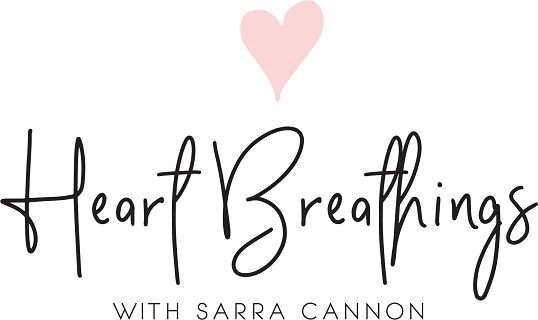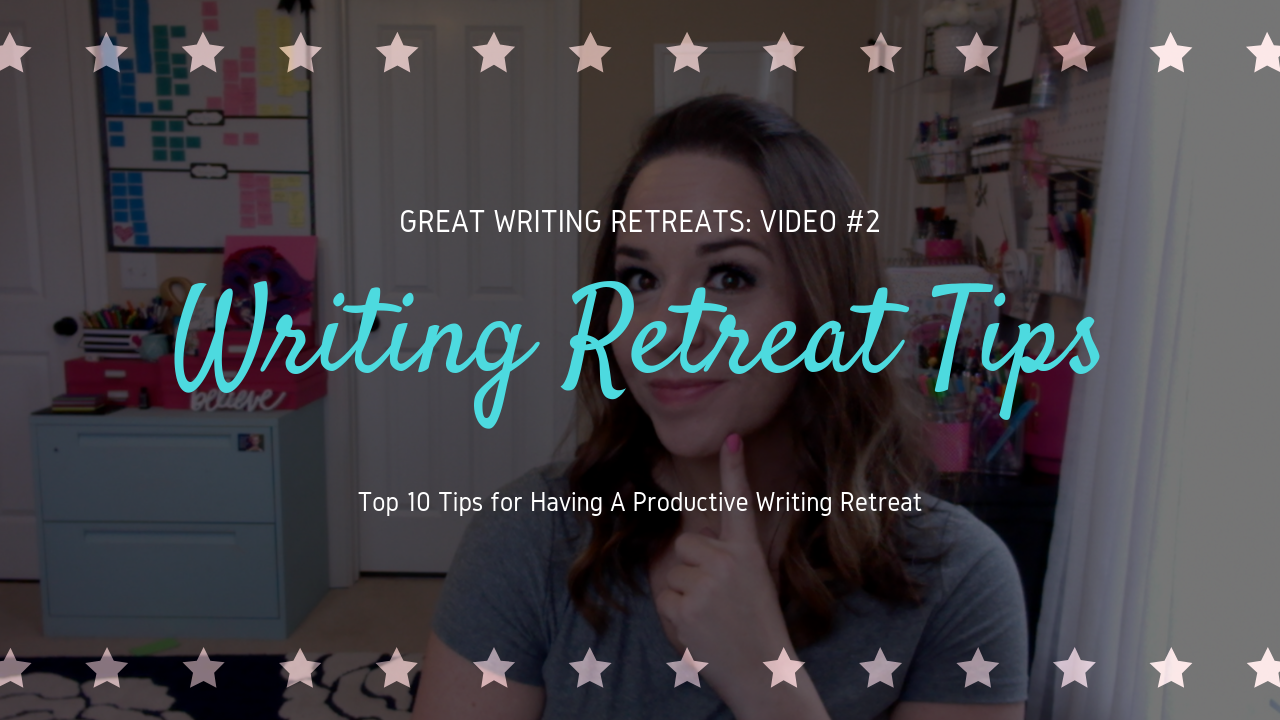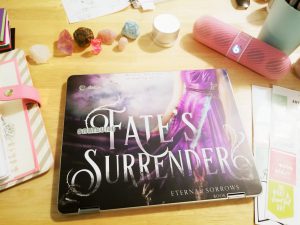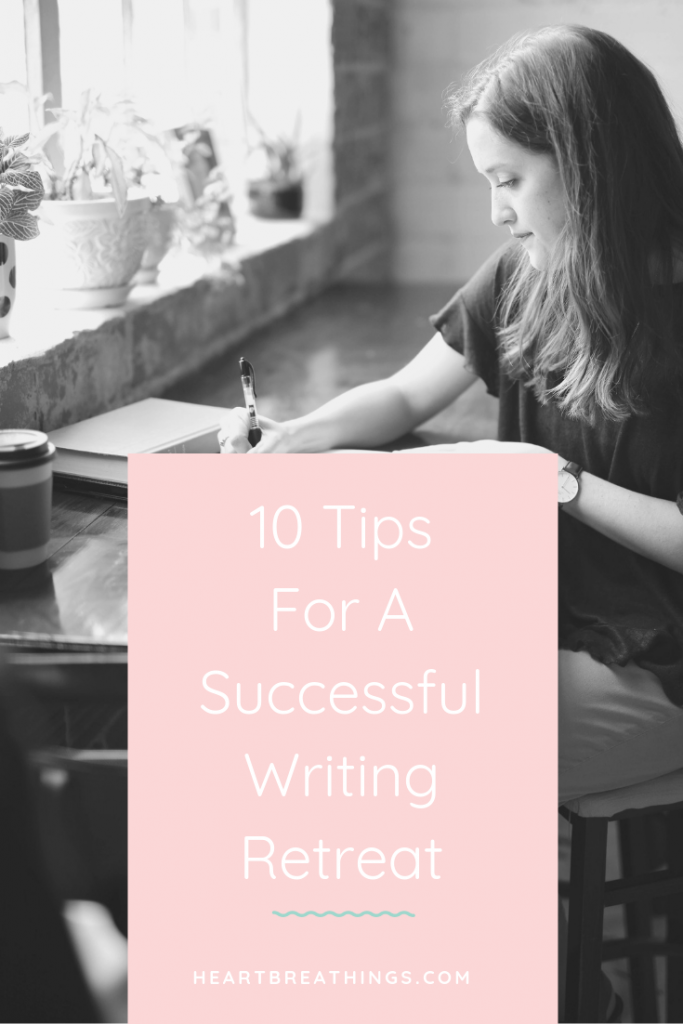

February 18, 2019 by Sarra Cannon

I just recently got back from an amazing and productive writing retreat in Hilton Head Island, and I thought it would be a great time to share with you my Top 10 Tips for a Successful Writing Retreat.
I first starting going on writing retreats back in 2011 when I was doing my best to keep up with a rigorous self-publishing schedule. I wanted to write at least 2-3 books per year, but in order to keep up with that kind of schedule for myself, I knew I needed to set aside a few times year when I could fully immerse and focus on my story. Writing retreats became my favorite way to both focus and to spend some much-needed time with fellow author friends.
Let’s face it, writing can be a very lonely profession, so getting together with writer friends a handful of times a year is good for the soul. It’s also great for productivity, as long as you don’t get lost in the social fun of seeing friends. It’s also very important to set yourself up for success, and over the years I’ve learned what the most important aspects of a great writing retreat are for me.
I am sharing these tips today in hopes that they will also help you to have a successful writing retreat soon.
Watch my full video featuring all of these top 10 tips for writing retreat success over on YouTube, or keep reading to find out more.
Before you head off to your writing retreat location, take a couple hours or even days to figure out exactly what you’ll be writing while you’re there. Even if you’re a chronic pantser, it’s so useful to have a list of scenes or some notes on which scenes or chapters you want to write while you’re away.
Trust me, there is nothing worse than paying for a retreat, taking time away from your kids, and getting there only to find that the words won’t flow because you have no clue what to write. For me, I have found that the more specific I am about which scenes I’m writing, the more words I can get done over the course of the retreat.
For this, I love to use index cards. I will grab a notecard, write the character’s pov the scene will take place in at the top, and then write out several sentences about what I see happening in this scene. Stuff like, “Parrish leads the group back to the compound. Along the way, they encounter a giant horde of zombies and have to fight them. Parrish unlocks a new ability with fire.”
Once I have a bunch of notecards ready to go, all I have to do when I get to the retreat is start up my sprints timer, grab a notecard, and start writing. Knowing what I’m writing before I get there makes all the difference for me in terms of productivity, and I highly recommend it.
You probably know by now that I’m a huge proponent of goal-setting in general. Writing retreats are no exception.
I always set a goal of how many words I’d like to write before I get to the retreat. This way, rather than just lazing around or aiming for something generic, I know exactly how much I want or plan to get done, and I can make strides every single day to move myself toward that target word count.
Just like with all goal-setting, though, it’s important to set a realistic goal. Something you can achieve without pushing yourself too hard or causing too much stress. You want to be productive, but you don’t want to burn yourself out.
The best way I’ve found to set a realistic goal is to take it in several steps:
I definitely have found that setting a goal ahead of time and working toward it incrementally throughout the retreat is key for success.

Another way I keep myself motivated and on track throughout my writing retreats is to keep track of my progress as I go. Of course, you can do this in a planner or on any plain sheet of paper, but I like to go big during writing retreats and put my progress right up on the wall where I can see it!
I use flip-chart paper like this at my retreats, pulling a sheet off each time and sticking it to the wall so I can write each sprint on the page and keep track of how far I’ve come. (Warning: If you use this kind of paper, be very careful what type of markers you use with it! Regular sharpies, for example, will bleed through the page and mark on the wall behind! You definitely don’t want to mess up someone’s wall at a rental, haha. Use markers like these special flip-chart markers.)
There’s just something about getting up after each sprint and writing that new word count on the large paper on the wall that always motivates me! And I love hitting the end of a retreat and seeing how far I’ve come. However, even if you don’t use a large flip-chart page, I highly encourage you to at least keep track of your progress along the way. You’ll be amazed and proud when you see just how much you’ve done.
If you want to have a successful writing retreat, you need to remove as many distractions as possible. Tell friends and family you’ll be away writing and don’t want to receive texts or calls while you are gone. Remove social media apps from your phone. Turn your phone on “do not disturb” so you don’t get interrupted while you’re writing. Whatever you can do to eliminate distractions, do it. Trust me on this one.
Day One, it might not seem so hard to stay away from distractions, but after you’ve been writing a lot, you’ll likely find it harder to keep your focus if you’ve got notifications dinging all around you. If you take the time and effort to remove or control these potential distractions ahead of time, you’ll be so glad you did. And you’ll get a lot more done!
I realize this may seem like a personal preference more than anything, but trust me when I say that this advice comes purely from my own experiences with eating both healthy and terrible at writing retreats. I’ve done it both ways!
When I first started going on retreats and doing what I call “hotel nights”, I used it as an excuse to eat ALL the junk food. I loaded up on Red Bull, oreos, chips, pizza, and other terrible foods. I thought that as long as I kept eating during breaks, I would have the energy to keep going. Plus, at the time, food like pizza made me happy, and I wanted to have fun on these retreats and treat them like vacations.
But what I found was that eating this way made me crash hard at some point during the night. I would feel bloated and tired by midnight, and despite cracking open another Red Bull, I would want to crawl into bed. I also found that I was so much more easily distracted.
After a particularly brutal recovery period after one of my writing retreats, I made the decision to try something new. I was going to eat as healthy as possible and see if I had a better result. Sure enough, I had the best writing retreat of my life. I felt so much better the entire time, I had more focus, and I got a lot more words with less effort.
After that, I committed to always eating healthy on my writing retreats. For me, that means no sugar or flour, no breads, no fried foods, and nothing but water, coffee, or tea to drink. I tend to stick to high-protein breakfasts, lots of veggies for lunch and dinner, and whole foods. For snacks, I choose things like veggies and hummus rather than chocolate bars.
For some of you, I realize that may just sound like torture, and that’s fine, haha. But just do me a favor and try one writing retreat where you only fuel your body with super healthy foods. I promise you will feel so much better and get more work done.

Whether you’re planning to check into a hotel, borrow a friend’s place, or move into an airbnb, make sure you’ve looked at the arrangement of the space first. Think about what you’ll need in order to be comfortable while you’re there.
If you prefer to write at a table with a chair and you have two people coming on the retreat, make sure there is enough table or desk space for two people. Most hotels don’t have a big table in the room, and they usually only have one desk, so just make sure the hotel can accommodate you in some way. My friend Zoe and I used to move the desk into the room and request an extra desk chair for the weekend if we were at a hotel, and that worked great.
If you love to write on the couch, make sure you have a couch available that looks big enough to suit your needs. It seems like a small thing, but if you aren’t able to get comfortable, you aren’t going to be able to write while you’re there!
Alternatively, if you do end up in a place that doesn’t have what you need, look for a local coffee shop or bookstore where you can go write during the day.
Writing is already one of the loneliest things you can do with your time. There’s no need to go on a writing retreat for a few days and be all alone! Besides, if you go with one or two friends, you guys can split the costs and make everything more affordable.
I also find that having a friend with me on retreats helps to create a good balance. During breaks, I have someone to take a walk with, talk to about my plot or characters, and chat with while I’m cooking dinner. Then, when it’s time to write, I have an accountability partner there to make sure I’m not crawling into bed to binge-watch YouTube instead.
And if you aren’t able to find a friend who can go with you on the retreat, think about setting up a virtual writing retreat with a group of friends and all joining in with sprints together through Facebook or group texts. Just knowing someone else is writing can often help to motivate you to get going, too.
One word of warning here, though!! If you have a friend with you that likes to talk (e.g. someone like me, haha), make sure you set boundaries and time limits, so you don’t end up chatting away the entire retreat without getting your work done.
When I would retreat with one of my friends I loved to talk to all the time, we had to set specific writing times. We would get up in the morning and say, “Okay, let’s eat breakfast and talk until 10. Then, no matter what, we write until noon!” We would always set time limits on our talk sessions, because if we didn’t, we would spend the entire day on the porch talking about our books and our lives! Fun, but not exactly productive!
Before you head out on a writing retreat with a friend, just make sure they know your expectations. Let them know this is a writing trip, first and foremost, and that you plan to write for X hours per day. It helps to set those expectations ahead of time and figure out boundaries so you both get your work done!
I’ve talked about this so much, but it’s always worth mentioning again. If you want to maximize your productivity, consider writing in sprints.
A sprint is basically just a set period of time where you focus on nothing but your words. To run one, just set a timer for, say, 20 minutes, and go. Don’t stop writing until the timer goes off.
Then, take a break to get up, walk around, think about your next scene, get some water, whatever you need to do. And when your break is over (I like to do either 5 or 10 minute breaks), sit back down and run another sprint.
This is called the Pomodoro Technique, and it’s useful for all types of work. I have found it to be particularly helpful for my writing ever since I discovered it during NaNo WriMo.
For me, this is the single most important productivity tool I use during my retreats (and all of my writing time in general). You can do sprints anywhere from 10 minutes to an hour, but I feel like most people tend to have a sprints “sweet spot” where they get the most possible words in the least amount of time. If you haven’t done sprints before, try a variety of times and see where you feel the best.
For me, I love 20 or 25 minutes, because it’s enough time for me to get through a significant part of a scene, but it’s not so long that I start to slow down and feel tired of writing. Try several timers for yourself and see what feels good! Once you find a timer that works for you, stick to it!
Just let your inner critic stay home when you go on a writing retreat, because seriously, there’s just no room for her at this condo!
If your goal during a retreat is to immerse in your story and get as many words as you can, you have to learn to turn off your inner critic. You know, that voice inside of you that tells you the words are crap and the story isn’t going well at all? Yeah, her. Leave her at home.
As you’re writing, just let the words flow. Yes, you might still hear that voice that tells you the words are crap, but for this retreat, you are going to give yourself permission to write crap. You can edit later, but for now, it’s about getting the words down and discovering the story.
Whenever you hear your inner critic creeping in, just tell her that you hear her but that you’re not going to listen to what she has to say right now. You’re going to write. Even if you know you’ll throw half of these chapters out when you get home, this is good work, because you’re immersed in this story and exploring how it might go. It doesn’t have to be perfect. It just needs to get done.

You’ve made it to the final tip for a successful writing retreat! Treat Yo’self!
If you’re going to dedicate several days to working your butt (and your mind) off, give yourself a nice, juicy reward for doing it. I find it so helpful to figure out what this reward will be before I even go. Remember when I talked about setting a goal? When you figure out your goal for the retreat, take some time to also figure out your reward.
In fact, I like to reward myself in some small way each day of a multi-day retreat. If I hit my Day One goal, for example, I will reward myself with an hour in bed watching YouTube before I crash for the night. If I hit my Day Two goal, I’ll go for a long walk on the beach. If I hit Day Three’s goal, we can go out to dinner instead of cooking. That kind of thing.
Hitting my entire retreat goal might mean something like a trip to Michael’s for some new washi tape on the way home or rewarding myself with a full day off watching movies on Netflix the next day.
It’s important to pat yourself on the back for a job well done and give yourself some kind of reward for doing such a great job with your writing. You deserve it!
Have you ever been on a writing retreat before? What are your top tips for success?
If you haven’t been yet, are you feeling inspired to try it? Let me know in the comments!
Oh! And if you want to see a vlog of my most recent writing retreat, check it out over on YouTube. Make sure to subscribe to my channel while you are there!


I have been self-publishing my books since 2010, and in that time, I've sold well over half a million copies of my books. I'm not a superstar or a huge bestseller, but I have built an amazing career that brings me great joy. Here at Heart Breathings, I hope to help you find that same level of success. Let's do this.
Yesssssssss to a Heart Breathings writing sprints group, please!! xoxo
Yes! I would love a Heart Breathings writing sprint group!
I love the idea of a writing retreat. I wish I lived closer to the beach. That would be a great place to have one!
I would love a sprint group!